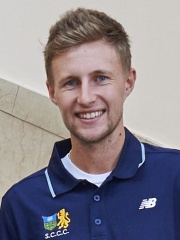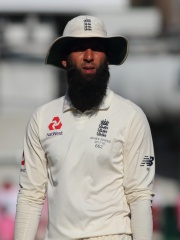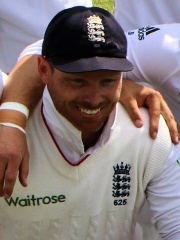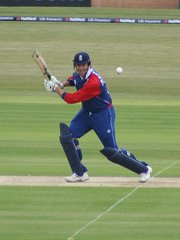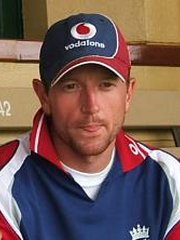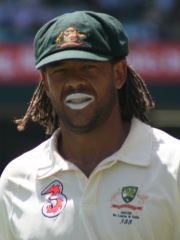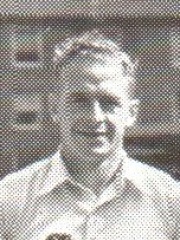




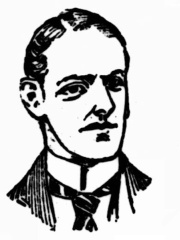
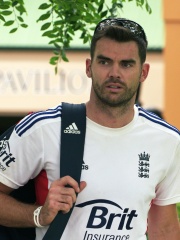
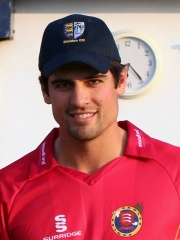
The Most Famous
CRICKETERS from United Kingdom
This page contains a list of the greatest British Cricketers. The pantheon dataset contains 136 Cricketers, 16 of which were born in United Kingdom. This makes United Kingdom the birth place of the 3rd most number of Cricketers behind India, and Australia.
Top 10
The following people are considered by Pantheon to be the top 10 most legendary British Cricketers of all time. This list of famous British Cricketers is sorted by HPI (Historical Popularity Index), a metric that aggregates information on a biography's online popularity. Visit the rankings page to view the entire list of British Cricketers.

1. Willie Watson (1920 - 2004)
With an HPI of 59.16, Willie Watson is the most famous British Cricketer. His biography has been translated into 20 different languages on wikipedia.
Willie Watson (7 March 1920 – 24 April 2004) was an English cricketer, who played for Yorkshire, Leicestershire and England. He was a double international, as Watson was also a footballer who played for England's national team. He was the son of Billy Watson, and brother of Albert Watson, also footballers.

2. William Donne (1876 - 1934)
With an HPI of 57.95, William Donne is the 2nd most famous British Cricketer. His biography has been translated into 15 different languages.
William Stephens Donne (2 April 1875 in Wincanton, Somerset – 24 March 1934 in Castle Cary, Somerset) was an English cricket player, and former president of the Rugby Football Union, and was a member of the cricket team that won a gold medal at the 1900 Summer Olympics.

3. W. G. Grace (1848 - 1915)
With an HPI of 52.63, W. G. Grace is the 3rd most famous British Cricketer. His biography has been translated into 36 different languages.
William Gilbert Grace (18 July 1848 – 23 October 1915) was an English cricketer who is widely considered one of the sport's all-time greatest players. Always known by his initials as "WG", his first-class career spanned a record-equalling 44 seasons from 1865 to 1908. Test cricket originated during his career, and he represented England in 22 matches from 1880 to 1899. In domestic cricket, he was mostly associated with Gloucestershire, the Gentlemen, Marylebone Cricket Club (MCC), and the United South of England Eleven (USEE). Right-handed as both batsman and bowler, Grace was an outstanding all-rounder who excelled at all the essential skills of batting, bowling, and fielding, though it is for his batting that he is most renowned, as he is held to have invented modern batsmanship. He dominated the sport during his career, and his technical innovations and enormous influence have left a lasting legacy. Usually opening the innings, he was particularly admired for his mastery of all strokes, and his level of expertise was said by contemporary reviewers to be unique. He generally captained the teams he played for at all levels because of his skill and tactical acumen. Grace nominally held amateur status as a player, but he was said to have made more money from his cricketing activities than any contemporary professional. He was an extremely competitive player and, though he was one of the most famous men in England, he was also one of the most controversial on account of his gamesmanship and moneymaking. He came from a cricketing family which included his elder brother Edward ("EM"), and his younger brother Fred. In 1880, they were members of the same England team, the first time three brothers played together in a Test match. Grace took part in other sports—as a young man, he was a champion 440-yard hurdler, and played football for the Wanderers. In later life, he developed enthusiasm for golf, lawn bowls, and curling. He qualified as a medical practitioner in 1879.

4. Andrew Flintoff (b. 1977)
With an HPI of 50.56, Andrew Flintoff is the 4th most famous British Cricketer. His biography has been translated into 18 different languages.
Andrew "Freddie" Flintoff (born 6 December 1977), is an English television and radio presenter and former international cricketer. Flintoff played all forms of the game and was one of the sport's leading all-rounders, a fast bowler, middle-order batsman and slip fielder. He was consistently rated by the ICC as being among the top international all-rounders in both ODI and Test cricket. Following his debut in 1998, Flintoff became an integral player for England and was England's "Man of the Series" in the 2005 Ashes. He later served as both captain and vice-captain of the team. He retired from Test cricket at the end of the 2009 Ashes series and from other forms of the game in 2010. He then had one professional boxing fight on 30 November 2012 in Manchester, beating American Richard Dawson on a points decision. In 2014, Flintoff came out of retirement to play Twenty20 cricket for Lancashire, before being signed by the Brisbane Heat to play in the Australian Big Bash League for the 2014–15 season. Since his retirement, Flintoff has been involved with numerous projects, including designing his own fashion range and becoming the face of clothing brand Jacamo, winning the first series of the Australian version of I'm a Celebrity...Get Me Out of Here! and being part of Sky One's sports-based comedy panel show A League of Their Own. Flintoff became a presenter of the BBC One car show Top Gear in 2019, remaining with the programme until he sustained injuries resulting from an accident during filming in late 2022.

5. Alfred Bowerman (1873 - 1947)
With an HPI of 50.39, Alfred Bowerman is the 5th most famous British Cricketer. His biography has been translated into 17 different languages.
Alfred James Bowerman (22 November 1873 – 20 June 1947) was an English cricketer who played two first-class matches for Somerset in the early 20th century, and also played in the only cricket match at the Olympic Games, at the 1900 Summer Olympics in Paris.

6. C. B. K. Beachcroft (1870 - 1928)
With an HPI of 49.74, C. B. K. Beachcroft is the 6th most famous British Cricketer. His biography has been translated into 16 different languages.
Charles B. K. Beachcroft (born Charles Beachey Kay; 21 January 1870 – 1 July 1928) was an English cricketer who was captain of the tournament-winning Devon and Somerset Wanderers team that represented Great Britain at the 1900 Summer Olympics, the only time cricket has been an Olympic sport.

7. Montagu Toller (1871 - 1948)
With an HPI of 48.09, Montagu Toller is the 7th most famous British Cricketer. His biography has been translated into 17 different languages.
Montagu Henry Toller (1 January 1871 – 5 August 1948) was an English cricketer who played for both Devon and Somerset in the late 19th century. He made six first-class appearances for Somerset, all in 1897, but was predominantly a good club cricketer. In 1900, he was part of the Devon Wanderers team that represented Great Britain in the 1900 Summer Olympics, the only time cricket has featured in the Olympics.

8. James Anderson (b. 1982)
With an HPI of 45.28, James Anderson is the 8th most famous British Cricketer. His biography has been translated into 19 different languages.
Sir James Michael "Jimmy" Anderson (born 30 July 1982) is an English cricketer who played for England from 2002 to 2024. He is currently serving as the fast-bowling mentor of the England cricket team, and continues to play for Lancashire. Widely regarded as one of the greatest bowlers in the history of the sport, he holds the record for the most wickets taken by a fast bowler in Test cricket (704) and third most wickets in international cricket (991). Anderson was a member of the England team that won the ICC Men's T20 World Cup in 2010. In February 2023, he became the oldest player to top the ICC men's Test bowling rankings. and is one of the few fast bowlers (after Maurice Tate in 1935 and Gubby Allen in 1948) to play at Test match level into his forties. Anderson made his Test debut in 2003, played for England's One-Day International (ODI) team between 2002 and 2015, and played for England's Twenty20 International (T20I) team between 2007 and 2009. On the occasion of England's 1,000th Test in 2018, Anderson was named in the country's greatest all-time Test XI by the England and Wales Cricket Board. Between 2016 and 2023, he had six spells as the top-rated Test bowler in the world according to the ICC men's player rankings. Anderson plays as a right-arm fast-medium swing bowler, though in his early days as a cricketer he was regarded as a fast swing bowler. Among fast bowlers, he is the leading Test wicket-taker of all-time, being the first fast bowler to take 600 or more Test wickets, and in March 2024 he became the first fast bowler to take 700 wickets, and is England's record Test wicket-taker. He has played the most Test matches for England, and the second most of any cricketer, behind Sachin Tendulkar. He is also England's highest wicket-taker in One Day Internationals with 269. As a batter, he shares with Joe Root the world record for highest tenth-wicket partnership in Tests (198). He retired from international cricket on 12 July 2024.

9. Alastair Cook (b. 1984)
With an HPI of 41.17, Alastair Cook is the 9th most famous British Cricketer. His biography has been translated into 17 different languages.
Sir Alastair Nathan Cook (born 25 December 1984) is a former English cricketer and the former captain of the England Test and One-Day International (ODI) teams. He retired from Test cricket in September 2018 and played for Essex in English domestic cricket until 2023, while also working for the BBC radio programme Test Match Special. Cook is considered to be one of the greatest opening batsmen in Test cricket. He is the sixth-highest Test run scorer of all time and second-highest run scorer for England. He is England's most-capped Test batsman and captained the England team in 59 Tests, as well as in 69 ODIs. He is the second highest run-scorer in Test matches for England, and the youngest player to score 12,000 Test runs (the sixth overall). A left-handed opening batsman, Cook scored 33 Test centuries for England. Cook played for Essex's Academy and made his debut for the first XI in 2003. He played in several of England's youth teams from 2000 until his call up to the Test side in 2006. Cook was called up to the England national team in India as a last-minute replacement for Marcus Trescothick and debuted, aged 21, with a century. He went on to score 1,000 runs in his maiden year and made centuries in his first Test matches against India, Pakistan, the West Indies and Bangladesh. Cook was appointed captain of the Test team after Andrew Strauss's retirement on 29 August 2012. After England's 2016 tour of Bangladesh and India, he stepped down as Test captain. Cook retired from international cricket after the 2018 series against India, and from all forms of cricket in October 2023. Cook was appointed MBE in 2011 and promoted to CBE in 2016 for services to cricket. In the 2019 New Year Honours, Cook was appointed a Knight Bachelor for services to cricket. On the occasion of England's 1000th Test in August 2018, Cook was named in the country's greatest Test XI by the ECB.

10. Jos Buttler (b. 1990)
With an HPI of 39.31, Jos Buttler is the 10th most famous British Cricketer. His biography has been translated into 18 different languages.
Joseph Charles Buttler (born 8 September 1990), known as Jos Buttler, is an English international cricketer and former captain of the national team. He plays for Lancashire in domestic cricket and played in multiple T20 leagues. He is known for his innovative and aggressive batting style. He was part of the England team that won the 2019 ODI World Cup and led the team to victory at the 2022 T20 World Cup. Buttler made his T20I debut in 2011, his ODI debut in 2012, and his Test debut in 2014. He was the vice-captain and a crucial member of the England team that won the 2019 Cricket World Cup, and made the run out during the Super Over which sealed victory in the final. He was appointed captain of England's limited-overs teams in June 2022. He captained England to victory at the 2022 T20 World Cup, top-scoring for England at the tournament. Buttler plays as a right-handed wicket-keeper-batsman. He is often regarded as England's greatest white-ball player in the history of the sport. He is England's most-capped T20I player . Along with Adil Rashid, he holds the world record for highest seventh-wicket stand in ODIs: 177 against New Zealand during their 2015 tour of England. He is England's highest run-scorer in T20Is, and is one of only five Englishmen to score a T20I century. As a wicket-keeper, he holds the England record for most dismissals in both ODI and T20I formats.
People
Pantheon has 19 people classified as British cricketers born between 1848 and 1990. Of these 19, 12 (63.16%) of them are still alive today. The most famous living British cricketers include Andrew Flintoff, James Anderson, and Alastair Cook. The most famous deceased British cricketers include Willie Watson, William Donne, and W. G. Grace. As of April 2024, 3 new British cricketers have been added to Pantheon including Chris Woakes, Marcus Trescothick, and Paul Collingwood.
Living British Cricketers
Go to all RankingsAndrew Flintoff
1977 - Present
HPI: 50.56
James Anderson
1982 - Present
HPI: 45.28
Alastair Cook
1984 - Present
HPI: 41.17
Jos Buttler
1990 - Present
HPI: 39.31
Jonny Bairstow
1989 - Present
HPI: 39.17
Joe Root
1990 - Present
HPI: 31.78
Moeen Ali
1987 - Present
HPI: 29.93
Chris Woakes
1989 - Present
HPI: 28.02
Ian Bell
1982 - Present
HPI: 27.54
Marcus Trescothick
1975 - Present
HPI: 27.51
Paul Collingwood
1976 - Present
HPI: 27.46
Stuart Broad
1986 - Present
HPI: 27.17
Deceased British Cricketers
Go to all RankingsWillie Watson
1920 - 2004
HPI: 59.16
William Donne
1876 - 1934
HPI: 57.95
W. G. Grace
1848 - 1915
HPI: 52.63
Alfred Bowerman
1873 - 1947
HPI: 50.39
C. B. K. Beachcroft
1870 - 1928
HPI: 49.74
Montagu Toller
1871 - 1948
HPI: 48.09
Andrew Symonds
1975 - 2022
HPI: 38.96
Newly Added British Cricketers (2025)
Go to all RankingsChris Woakes
1989 - Present
HPI: 28.02
Marcus Trescothick
1975 - Present
HPI: 27.51
Paul Collingwood
1976 - Present
HPI: 27.46
Overlapping Lives
Which Cricketers were alive at the same time? This visualization shows the lifespans of the 7 most globally memorable Cricketers since 1700.


